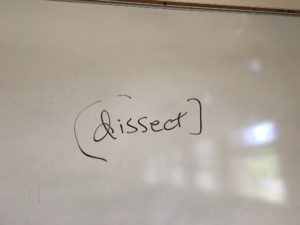How many times have I heard “why are you doing that”, “what are you going to do with those subjects”, and “oh that’s interesting” followed by an awkward pause when I tell people I study biology and English? Too many times. It makes sense to me, but to other people, studying two distinct disciples is a foreign idea. After being questioned all the time, I began to wonder whether or not it was a good idea to study two different fields at one time. What was the reasoning behind my major/minor decision? I had no intention of reconsidering my studies, but it did make me reflect on why I did what I did. I thought that I just liked the two subjects and that was a good enough reason, but I never really considered if there was a stronger driving force. Then I read the introduction to Interdisciplinarity and it reassured my thought process.
American Education and Interdisciplinarity
Though it might not be completely responded to one of our last readings, Interdisciplinarity, this is what I felt during reading it.
I am often asked by people, “Why are you studying in the United States, rather than studying in your home country?” This is a-piece-of-cake question; I decided to study abroad to the United States because American education uniquely varies from other countries’ educations. Continue reading “American Education and Interdisciplinarity”
The Proven Sound of Interdisciplinarity
“Is music an art or a science?”
This was the question my music professor asked during class this morning. Silence wafted in the air but I could tell that a general consensus had already been made. Finally a brave voice says, “Art.”
My professor then asks, “Is there anyone here that can define art?” Silence arises again.
“No.” Someone else responds.
My professor smiles then stands behind the grand piano in the room and asks our class to sing the musical patterns that he played. We hummed, sang short and long notes with different stresses and volumes all while receiving instructions on how best to perform these tasks. I began to pay special attention to the word choice in my professor’s instruction and explanation on the purpose of our recitations. They sounded like this, “More air suggests more volume.” and “Changing the shape of the mouth changes the tone quality [of the note].”
Almost instantly I was reminded of how academic disciplines can intertwine in ways that may not seem obvious at first, but hold significance to the discipline itself. In his Interdisciplinarity, Joe Moran expresses that, “…interdisciplinarity is always transformative in some way producing new forms of knowledge in its engagement with discrete disciplines.” (15). Sitting in my music class and watching my professor take a physiological approach to the “art” of music and musical performance proved Moran right. The difficulty in placing an exact definition on this term wasn’t something I understood until just then while hearing how science and art compliment each other to create music.
My professor goes on to explain how the vibration of strings affects the sound of a note, some moving as fast as 400 vibrations a second. After this fact he walks from behind the piano and says, “To [me,]a performing musician that’s not science, that’s art.”.
Criticism of New Criticism
My dear Mr. Ransom, et. al.: You are the founders of New Criticism, a literary movement that focuses on a text as a single, wholesome entity unto itself. Your method for analyzing literature leaves me with some questions: How do the past and the present have nothing to do with the future? If you like to see poems as objects, as fixed anecdotes in time, will you not see humans this way also? But do I not have a mother? Does her past not affect me? Her childhood? Am I living in white space, as in cartoons, while you peer down at me through a microscope?
The answer is no. My family’s experiences and histories are completely relevant to consider in a critical analysis of the woman I am. I know that subjectivity may seem a hindrance to you, as you seem to dislike thinking about the histories behind writing and the gilded futures they create, winding thread in the minds of readers who will use it to connect the facts. Utilizing measured objectivity is necessary for all fields of study, of course. In this you are correct. However, it is a tradition misguided in its use, as the academic world has learned from the ancients to prize what can be tested and observed above the careful language chosen from a churning heart. Continue reading “Criticism of New Criticism”
Jumping up and down about dissection
Yep, I literally jumped up and down in the classroom when the word dissect appeared in the class discussion about what, according to your experiences, students are often trained to do with literature (in this case, Jean Toomer’s poem, “Reapers”).
As you noted in class, dissection is often associated with the sciences, biology in particular.
So here are some questions that you could turn into a blog post if you so desire: Does the introduction * to Moran’s Interdisciplinarity help you understand talk about how dissection has ended up appearing so frequently in conversations about English classes? If so, how? If not, how not?
* There’s an embedded link to Milne’s e-book of Interdisciplinarity. To get to it, you’ll have to be logged in with a Geneseo username and password.
